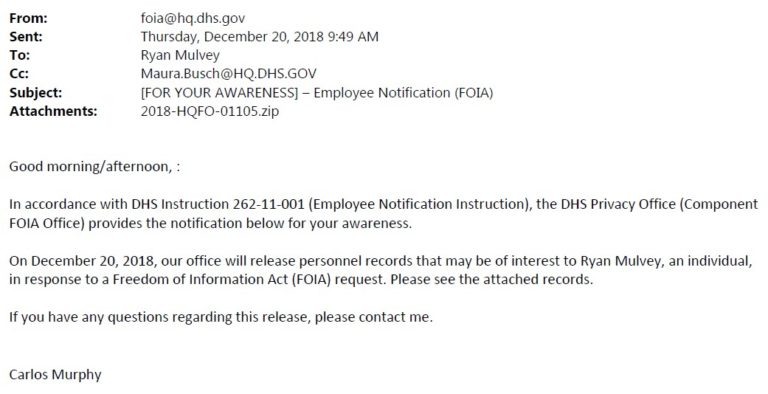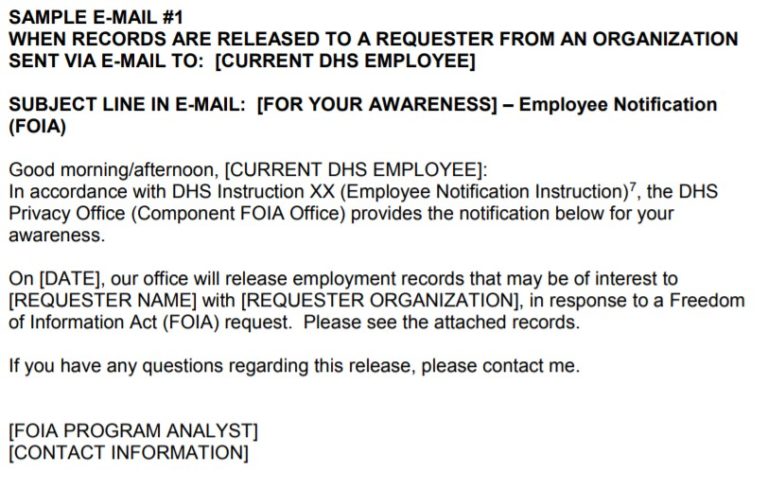Government official caught using personal email to conduct official business ordered to maintain copies of all records in Gmail account
Washington, D.C. (April 26, 2019) – Cause of Action Institute (CoA Institute), a nonpartisan government watchdog organization, today announced it had secured a rare federal court order requiring a former U.S. Department of Justice (DOJ) employee to preserve the contents of her personal email account, which had been used to conduct official agency business. Those records may be subject to later release.
Ryan Mulvey, counsel for CoA Institute, issued the following statement:
“Government transparency is a fundamental necessity in a free and open society. The use of personal devices to conduct official business remains a serious concern, resulting in records being lost, unsecured, or improperly destroyed. In some cases, personal email accounts are used to avoid disclosure altogether. This court order is an important reminder to all government employees to avoid using personal email and devices and adhere to all relevant agency rules and government transparency statutes. It also is a warning to agencies to ensure that they meet their record-keeping obligations.”
U.S. District Court Judge Amit Mehta granted Cause of Action’s motion, ordering the U.S. Department of Justice to require a former employee, Sarah Isgur Flores, not to delete any emails stored in her personal Gmail account, and to store copies of the account’s contents onto a thumb drive or other storage device, including all emails in archived or deleted folders. The Court also ordered Ms. Flores to maintain the emails until further instructed, and gave the U.S. Department of Justice until May 2, 2019 to provide notice of its compliance with the preservation order. Although the issuance of such a preservation order is rather rare, it is the latest example in a developing trend. Federal courts have become increasingly concerned about the use of personal email to conduct agency business, and they are taking serious the possible loss or destruction of government records that may be subject to the Freedom of Information Act (FOIA) and other federal records management statutes, including the Federal Records Act.
Background
In 2017, media reports indicated that Sarah Isgur Flores, then-spokeswoman for Attorney General Jeff Sessions, used her personal email to issue official statements on behalf of the government. Due to concerns that this sort of behavior could harm the public’s access to official records, and in light of past instances of personal email having been used as a way to conceal public information, Cause of Action Institute filed a FOIA request for Ms. Flores official work-related emails sent or received through her personal devices or accounts. After waiting more than 18 months for a response, CoA Institute sued DOJ to force the disclosure of the Flores records.
On September 27, 2018, DOJ responded, “As is evident from the enclosed records, Ms. Flores forwarded emails sent to her personal account to her official Department of Justice email account, including through an automatic forward. As such, all of these emails were located pursuant to our search of Ms. Flores’ official Department of Justice email account.”
However, within the 112 pages produced by DOJ, the original email issued by Ms. Flores, as reported by members of the press, was missing. Despite raising this issue with DOJ, the government insisted the 112 pages were a full-and-complete record. As a result, and after learning of Ms. Flores’s departure from public service, CoA Institute filed a motion, urging the court to compel DOJ and Ms. Flores to preserve all relevant records.
Late on Thursday, April 25, the Court granted CoA Institute’s motion in full, compelling the government to coordinate with Ms. Flores to preserve her personal email account and maintain copies pending further court proceedings.
-30-
CoA Institutes’s Motion for Preservation Order
Federal Court’s Order for Preservation of Records
Related Stories:
- Records Show How Former FBI Director James Comey Misled the DOJ Inspector General About His Personal Email Use
- Federal Judge Confirms Agencies’ FRA Record Recovery Efforts Must Include Reaching Out to Third-Party Email Providers
- Federal judge rejects DOJ’s use of attorney-client, deliberative process privileges to hide communications with the White House Counsel from public disclosure
- CoA Institute opens government-wide investigation into agency implementation of the FOIA’s “foreseeable harm” standard
- Cause of Action Institute Submits Comment Criticizing Proposed Revisions to Department of the Interior’s FOIA Regulations
- CoA Institute Sues OMB, Compelling it to Take Transparency Policy Seriously
- Cause of Action Sues Commerce Dept. for Failing to Release Auto-Tariff Report









